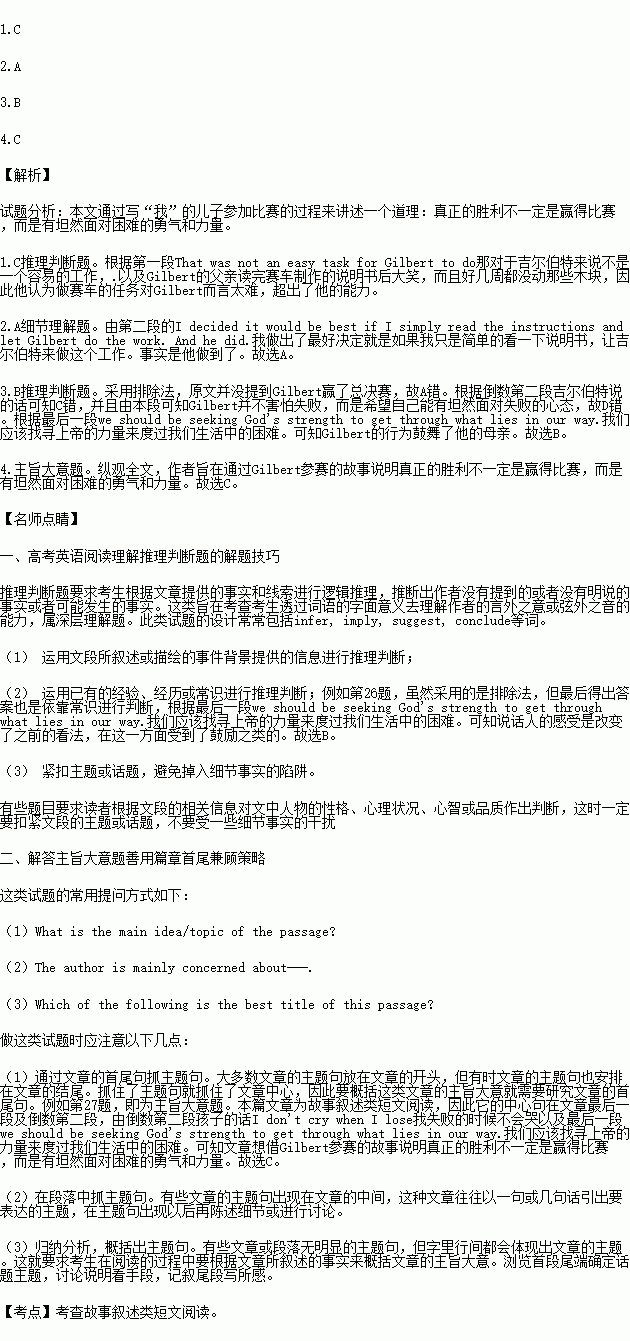题目内容
My son Gilbert was eight years old and had been in the Cub Scouts (童子军团) only a short time. Once he was handed a sheet of paper, a block of wood and four tires and told to return home and give them all to his father. That was not an easy task for Gilbert to do. The piece of paper was a set of instructions about how to build a wooden racing car. Gilbert's father laughed when he read the instructions. The block of wood remained untouched as the weeks passed.
Finally, I stepped in to see if I could figure it all out. Having no skills, I decided it would be best if I simply read the instructions and let Gilbert do the work. And he did. Within days, his block of wood was turning into a pinewood racing car.
Then the big night came. With his pinewood racing car in his hand and pride in his heart we headed to the big race. As the race was done in elimination fashion (淘汰赛形式), you could keep racing as long as you were the winner.
Finally, it was between Gilbert and the fastest?looking car there. As the race was about to begin, Gilbert asked if they could stop for a minute, because he wanted to pray. Then the race stopped.
Gilbert prayed in earnest for a very long minute. The Master came up to Gilbert and asked the obvious question, “So you prayed to win, Gilbert?”
My young son answered, “Oh, no Sir. It wouldn't be fair to ask God to help you beat someone else. I just asked him to make it so I don't cry when I lose.”
Children seem to have wisdom far beyond us. Perhaps we spend too much of our prayer time asking God to control the race, make us the champion, or remove us from the struggle, when we should be seeking God's strength to get through what lies in our way.
1.Gilbert's father thought the task given by the Cub Scouts could________.
A. be no trouble at all
B. be too easy for Gilbert
C. be beyond Gilbert's ability
D. require no skills
2.Who finally made the pinewood racing car?
A. Gilbert. B. Gilbert's father.
C. Gilbert's mother. D. The whole family.
3.What can we learn about Gilbert?
A. He made it in the final race.
B. His performance inspired his mom.
C. He thought the Master unfair.
D. He was very afraid of losing the race.
4.The author writes this passage to tell us that ________.
A. adults should communicate more with children
B. we should have faith in our ability to win
C. victory is the power to overcome difficulties
D. friendship is more important than winning
 开心快乐假期作业暑假作业西安出版社系列答案
开心快乐假期作业暑假作业西安出版社系列答案 名题训练系列答案
名题训练系列答案

 增加:在缺词处加一个漏字符号( ),并在其下面写出该加的词。
增加:在缺词处加一个漏字符号( ),并在其下面写出该加的词。